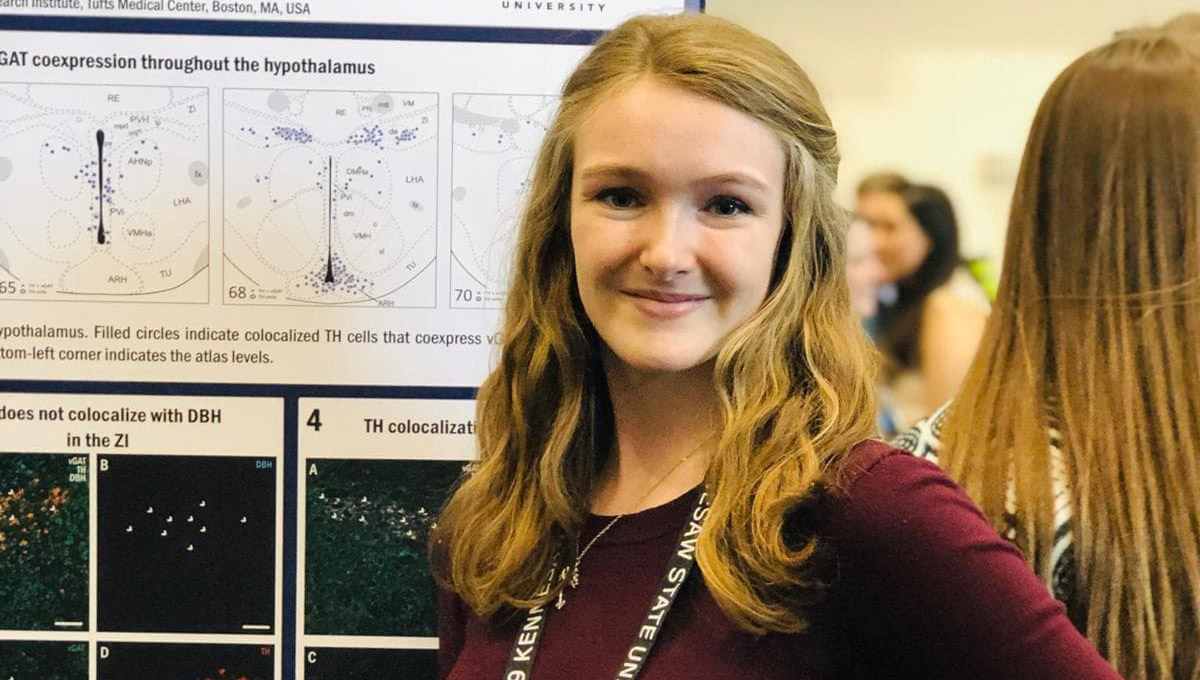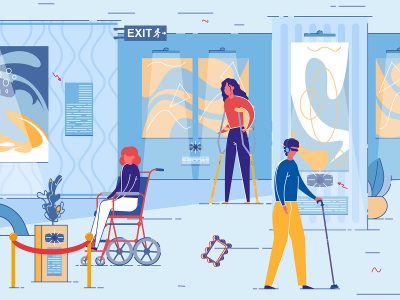By Leah Coppella
When Kayla Schumacker first applied to Carleton University’s Neuroscience and Mental Health program, she couldn’t know that one day she would present at the renowned Society for Neuroscience conference in Washington, D.C., never mind win a Viewer’s Choice Award.
“I was just looking through brochures and I came across Carleton’s neuroscience program. It really resonated with me because I would be able to study the brain while maintaining the science aspect of it as well, instead of just a general psychology program,” she says.

Kayla Schumacker
Later, that data would be the stepping stone to an impressive thesis, especially for an undergraduate.
Schumacker was a student in Prof. Melissa Chee’s lab when she uncovered her research topic. She started by looking at cells in the hypothalamus, a region of the brain involved in feeding, stress, sex and other homeostatic behaviours.
“We were looking at cell populations there that co-express dopamine, a neurotransmitter that has wide effects on the brain, and GABA, which is the main inhibitory neurotransmitter,” she says.
“What we found is that in the hypothalamus, there was very high colocalization (overlap), so almost every dopamine cell co-expressed GABA,” she says.
This discovery led Schumacker to look in depth at one of those brain regions called the arcuate nucleus, a key factor in her hypothesis at the Young Researchers Conference in Ottawa.
At the conference, she explained how one nucleus in the hypothalamus, known as the zona incerta, had 100 per cent colocalization, but only at one specific brain atlas level. This is a significant finding because it shows a unique pattern that is not seen in any other hypothalamic nucleus.
Schumacker’s passion for mental health also has roots in her personal life.
“My family has a history of mental illness and it’s always resonated with me to look into it, to research it, to help those who are struggling with it,” she says.
Her dedication to mental health doesn’t only lie in her academic life. As a brain health advocate, she supports a wide variety of community organizations and studies.
“One day I heard about a study going on at the Children’s Hospital of Eastern Ontario (CHEO) where they needed volunteers to help with their research on a study looking at self-harm in adolescent females. So, since my second year, I’ve been volunteering with CHEO with that study doing the Trier social stress test,” she says.
Schumacker explains that the stress test simulates an acute stressor in a controlled environment, in order to study the stress hormones produced and how they differ in teenage girls with self-harm tendencies.
Through the Society for Neuroscience, Ottawa Chapter, Schumacker helped organize the Brain and Mental Health Art Show. The annual event brings the local Ottawa community together to bring awareness to mental health while supporting charities in the city.
Schumacker also volunteered for Carleton’s Student Alliance for Mental Health and Brain Awareness Week, where she presented at local schools in the community about the brain.
She received the Provost Scholar Award for her exceptional student accomplishments and manages to maintain all her activities through a distinct ambition to succeed.
“I have very high standards for myself and for what I want to achieve in the future . . . everything that I’ve done has been around what I’ve been wanting to do,” she adds.
Schumacker likes to leave things on a cheery note: “There’s always a reason to be happy and there’s always a reason to smile, even if it’s something small,” she adds.
Now that she’s got a Bachelor of Science under her belt, she plans to start her master’s this fall.
Spring Convocation is taking place from Monday, June 10 until Friday, June 14. The ceremonies will be broadcast online via live streaming at Carleton.ca/convocation/live.
Monday, June 3, 2019 in Convocation, Faculty of Science
Share: Twitter, Facebook



